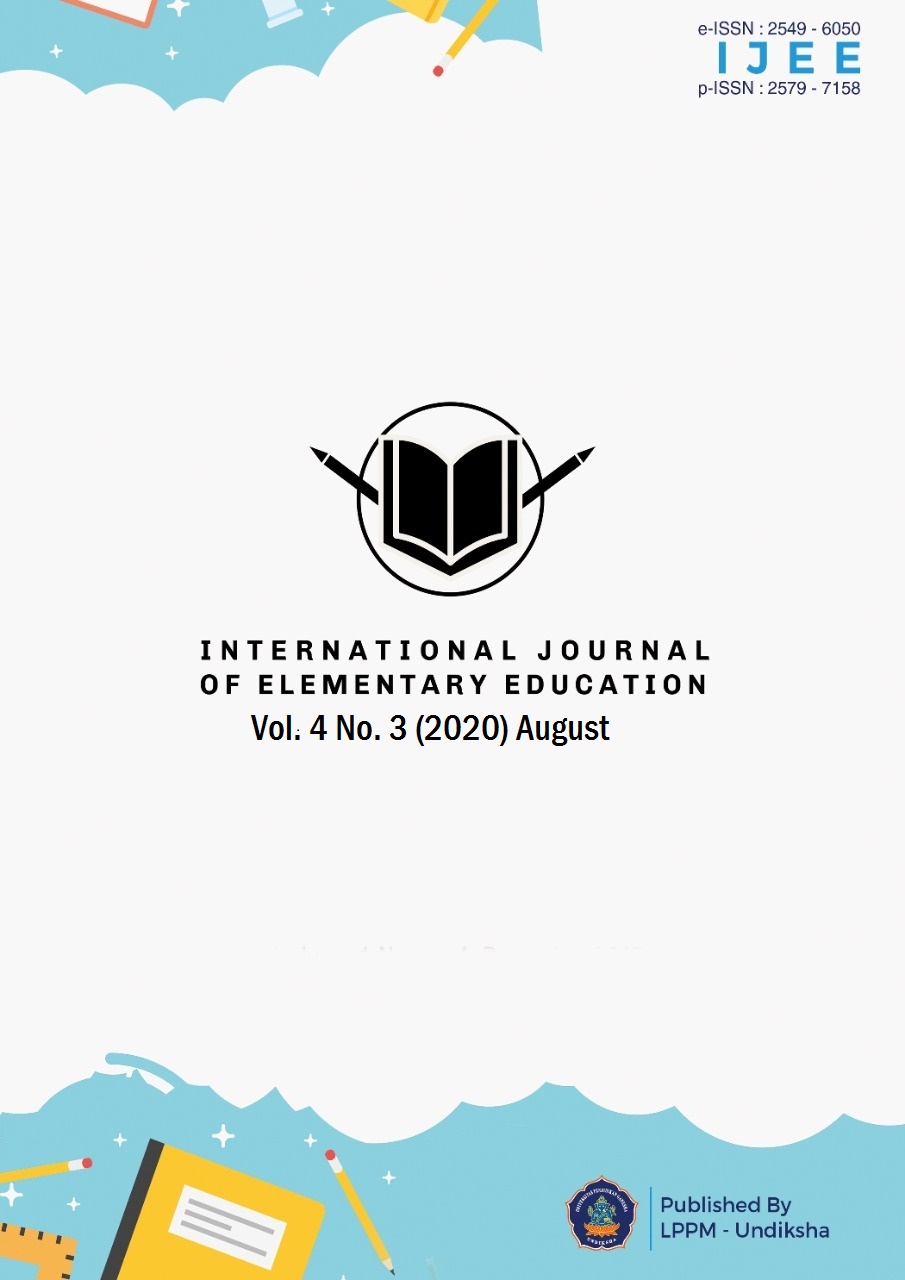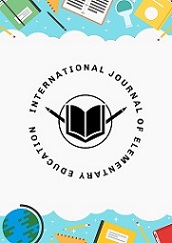Student Teams Achievement Division Technique and Group Investigation Technique through Lesson Study Enhancing Students Learning Outcomes
DOI:
https://doi.org/10.23887/ijee.v4i3.26067Kata Kunci:
learning outcomes, STAD and GI techniques, lesson studyAbstrak
The finding of learning outcomes is low in this study; therefore, this study aims to determine the effectiveness of constructivism theory with the Student Teams Achievement Division technique and Group Investigation techniques through Lesson Study related to thematic learning in fifth-grade elementary school. This research is a quasi-experimental research design with Randomized Control Trials (RCTs). The population of this research is 26 students in VB class. 13 VB class students as an experimental group and 13 VB class students as a control group. Obtaining data was collected with 30 multiple choice test instruments. Data collected were analyzed using descriptive statistics and an Independent Sample t-test. Based on the results of the study after testing the hypothesis using SPSS 25.00 for Windows in the decision table the value of Sig. (2-tailed) = 0.005 which means the significance value (2-tailed) <0.05 (0.005 <0.05), then H0 is rejected and H1 = accepted. This means that the results of the study indicate that there is a significant influence on the experimental group taught by the Student Teams Achievement Division technique and the Group Investigation technique through lesson study with a control group that the teacher learns as usual on student learning outcomes. Thus, it can be concluded that the theory of constructivism with the Student Teams Achievement Division technique and Group Investigation lesson study techniques effectively improve the thematic learning outcomes of VB grade students.
Referensi
Andi, I. P., Arsana, B., Jampel, I. N., & Kusmariyatni, N. (2017). Pengaruh model pembelajaran kooperatif tipe stad ips kelas IV SD Universitas Pendidikan Ganesha. (1). http://dx.doi.org/10.23887/jjpgsd.v5i2.11031
Ariawan, K. D., Jampel, I. N., & Rati, N. W. (2016). Pengaruh Model Pembelajaran Kooperatif Tipe Group Investigation Berbasis Media Lingkungan Terhadap Hasil Belajar Ipa Siswa Kelas Iv Di Desa Sidetapa. E-Journal PGSD Universitas Pendidikan Ganesha, 4(1), 1–10. http://dx.doi.org/10.23887/jjpgsd.v4i1.6609
Ariztasari, I. (2018). Enhancing the Critical Thinking Ability of Events in Life through the Cooperative Model Think Pair Distribute VA Class at SDN Giwangan. Pendidikan Guru Sekolah dasar:DIDAKDITA, 1(June). https://doi.org/10.21831/didaktika.v1i1.28079
Budiarto, E. (2004). Metode Penelitian Kedokteran. Jakarta: Penerit Buku Kedokterann.
Budiastra, I. K., Sudana, D. N., & Arcana, N. (2015). Pengaruh Model Kooperatif Tipe Gi ( Group Investigation ) Terhadap Keterampilan Berpikir Kritis Dalam Pembelajaran IPA Jurusan Pendidikan Guru Sekolah Dasar , FIP Universitas Pendidikan Ganesha. E-Journal PGSD, 3. http://dx.doi.org/10.23887/jjpgsd.v3i1.4812
Dewi, P. P. Y., Manuaba, I. S., & Suniasih, N. W. (2018). Pengaruh Model Pembelajaran Kooperatif Tipe Group Investigation Terhadap Hasil Belajar Ipa Siswa Kelas Iv Sekolah Dasar. Jurnal Penelitian Pendidikan Guru Sekolah Dasar, 6(11), 264–271. http://dx.doi.org/10.23887/ijee.v1i4.12957
Dharsana, I. K., Suarni, N. K., & Mahendra, I. G. N. (2020). Efektivitas Konseling Behavioral dengan Teknik Modeling untuk Meningkatkan Self Autonomy melalui Lesson Study. Jurnal Ilmiah Bimbingan Konseling Undiksha, 10 (2), 87. 10.23887/jibk.v10i2.23281
Dharsana, K. (2014). Model-model, Teori, Teknik, Skill Bimbingan Konseling. Singaraja: Universitas Pendidikan Ganesha.
Esminarto, E., Sukowati, S., Suryowati, N., & Anam, K. (2016). Implementasi Model Stad Dalam Meningkatkan Hasil Belajar Siwa. Briliant: Jurnal Riset Dan Konseptual, 1(1), 16. http://dx.doi.org/10.28926/briliant.v1i1.2
Fadhilaturrahmi. (2017). Penerapan Pendekatan Saintifik Untuk Meningkatkan Kemampuan Komunikasi Matematik Peserta Didik di Sekolah Dasar. EduHumaniora | Jurnal Pendidikan Dasar Kampus Cibiru, 9(2), 109. https://doi.org/10.17509/eh.v9i2.7078
Inapi, M. L. (2018). Pengaruh Model Pembelajaran Kooperatif Terhadap Motivasi Dan Hasil Belajar Siswa Pada Materi Sistem Koloid. Pembelajar: Jurnal Ilmu Pendidikan, Keguruan, Dan Pembelajaran, 2(1), 12. https://doi.org/10.26858/pembelajar.v2i1.4135
Irawan, F. J., & Ningrum, N. (2016). Pengaruh Penggunaan Model Cooperative Learning Tipe Group Investigation (Gi) Terhadap Hasil Belajar Prakarya Dan Kewirausahaan (Pkwu) Siswa Kelas X Semester Genap Smk Negeri 1 Metro Tp 2015-2016. PROMOSI (Jurnal Pendidikan Ekonomi), 4(2), 61–68. http://dx.doi.org/10.24127/ja.v4i2.641
Kirom, A. (2017). Peran Guru Dan Peserta Didik Dalam Proses Pembelajaran Berbasis Multikultural. Al Murabbi, 3(1), 69–80. Retrieved from https://jurnal.yudharta.ac.id/v2/index.php/pai/article/view/893
Lasfeto, A. R. (2017). Meningkatkan Hasil Belajar Ipa Melalui Model Group Investigation Berbantuan Video Pada Siswa Sekolah Dasar. Jurnal Penelitian Dan Pengembangan Pendidikan, 1(3), 1–7. http://dx.doi.org/10.23887/jppp.v1i3.12631
Lisnani, L. (2019). Pengaruh Model Pembelajaran Example Non Example Untuk Meningkatkan Hasil Belajar Tematik Bagi Siswa Kelas VI Sd. Jurnal Basicedu, 3(1), 76–82. https://doi.org/10.31004/basicedu.v3i1.81
Peraturan Perundang-undangan N0. 19 Tahun 2005. (2005). Standar Nasional Pendidikan.
Prasetyo Widyanto. (2017). Penerapan Metode Pembelajaran Group Investigation Berbantuan Media Flanelgraf Untuk Meningkatkan Minat Dan Hasil Belajar Siswa Pada Mata Pelajaran Ipa. Jurnal Pendidikan Dasar Nusantara, Vol. 3(No. 1), h. 120. https://ojs.unpkediri.ac.id/index.php/pgsd/article/view/708
Purwoko, B., Prawitasari, J. E., Atmoko, A., & Handarini, D. M. (2016). Keefektifan Konseling Resolusi Konflik untuk Mengatasi Konflik Interpersonal pada Siswa Sekolah Menengah Atas. Jurnal Pendidikan Humaniora, 4(1), 53–63. http://journal.um.ac.id/index.php/jph/article/view/8206
Putra, P. G. N., Margunayasa, I. G., & Wibawa, I. M. C. (2019). Pengaruh Model Pembelajaran Kooperatif Tipe Group Investigation (GI) Berbasis Lesson Study Terhadap Penguasaan Konsep IPA. Jurnal Pedagogi Dan Pembelajaran, 1(2), 84. http://dx.doi.org/10.23887/jp2.v1i2.19329
Samja, J. (2017). The Influence Of Cooperative Learning Model Student Team €Tm S Achievement Division ( Stad ) For Student Results On The Subject Of Education History In Senior High School ( SMAN ) I Mata Pelajaran Pendidikan Sejarah Di Sekolah Menengah Atas Negeri ( SMAN ). Neliti :Pendidikan Sejarah FKIP-Universitas Riau, 4, 1–11. https://www.neliti.com/publications/189875/pengaruh-penggunaan-model-pembelajaran-kooperatif-tipe-student-teams-achievement
Sidabutar, G. S., & Dharsana, I. K. (2018). Pengaruh Model Pembelajaran Kooperatif Tipe Two Stay Two Stray melalui Lesson Study terhadap Hasil Belajar IPA. E-Journal PGSD Mimbar PGSD, 6(2), 103–111. http://dx.doi.org/10.23887/jjpgsd.v6i2.19463
Suarni, N. K., & Sulasih, A. N. K. (2017). Penerapan Model Pembelajaran Kooperatif Tipe Stad Dengan Media Rotation Point Untuk Meningkatkan Hasil Belajar. International Journal of Elementary Education, 1. http://dx.doi.org/10.23887/ijee.v1i1.11436
Sudiasih, N. N., Wibawa, I. M. C., & Margunayasa, I. G. (2020). Pengaruh Model Pembelajaran Group Investigation Melalui Lesson Study Terhadap Penguasaan Konsep Ipa Siswa. EduHumaniora | Jurnal Pendidikan Dasar Kampus Cibiru, 12(1), 25–36. https://doi.org/10.17509/eh.v12i1.18543
Suparmi, S. (2013). Pembelajaran Kooperatif dalam Pendidikan Multikultural. Jurnal Pembangunan Pendidikan: Fondasi Dan Aplikasi, 1(1), 108–118. https://doi.org/10.21831/jppfa.v1i1.1055
Supriadi. (2017). Pemanfaatan Sumber Belajar Dalam Proses Pembelajaran. Lantanida Journal, 3(2), 127. http://dx.doi.org/10.22373/lj.v3i2.1654
Tembang, Y., Harmawati, D., & Rahajaan, J. P. (2019). Peningkatan Hasil Belajar IPA Siswa Melalui Penerapan Model Pembelajaran Kooperatif Tipe Group Investigation di Sekolah Dasar. Jurnal Ilmiah Sekolah Dasar, 3(2), 230–237. http://dx.doi.org/10.23887/jisd.v3i2.17643
Tendrita, M., & Sari, A. P. P. (2020). Bioedusiana Team Achievement Divisions ( STAD ) Dipadu Rqa Berbasis Lesson. Bioedusiana, 5(1), 1–10. https://doi.org/10.34289/bioedu.v5i1.1427
Wahyuningsih, I. (2017). Pengaruh Model Pembelajaran Kooperatif Tipe Group Investigation Terhadap Hasil Belajar IPA. NATURAL: Jurnal Ilmiah Pendidikan IPA, 4(1), 26–33. http://dx.doi.org/10.30738/natural.v4i1.1861
Wicaksono, B., Sagita, L., & Nugroho, W. (2017). Model Pembelajaran Group Investigation (Gi) Dan Think Pair Share (Tps) Terhadap Kemampuan Berpikir Kritis. Aksioma, 8(2), 1. https://doi.org/10.26877/aks.v8i2.1876
Yuniarti, D., Bagus, I., Surya, G., & Wiyasa, I. K. N. (2018). Pengaruh Model Student Teams Achievement Divisions ( STAD ) Berbantuan Media Mind Mapping Terhadap Hasil Belajar IPS Siswa Kelas V SD Gugus III Kuta Utara Badung Tahun Ajaran 2017 / 2018. Mimbar PGSD Undiksha, 6(1), 1–7. http://dx.doi.org/10.23887/jjpgsd.v7i1.16970
Unduhan
Diterbitkan
Cara Mengutip
Terbitan
Bagian
Lisensi
Authors who publish with the International Journal of Elementary Education agree to the following terms:
- Authors retain copyright and grant the journal the right of first publication with the work simultaneously licensed under a Creative Commons Attribution License (CC BY-SA 4.0) that allows others to share the work with an acknowledgment of the work's authorship and initial publication in this journal.
- Authors are able to enter into separate, additional contractual arrangements for the non-exclusive distribution of the journal's published version of the work (e.g., post it to an institutional repository or publish it in a book), with an acknowledgment of its initial publication in this journal.
- Authors are permitted and encouraged to post their work online (e.g., in institutional repositories or on their website) prior to and during the submission process, as it can lead to productive exchanges, as well as earlier and greater citation of published work. (See The Effect of Open Access)










